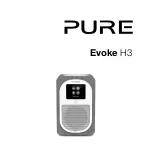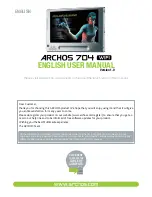
Owner’s Manual for Portable Generator
9
Section 3 Operation
Operation and Use Questions
Call Customer Service at 1-855-447-3734 with
questions or concerns about equipment oper-
ation and maintenance.
Before Starting Engine
1. Verify engine oil level is correct.
2. Verify fuel level is correct.
3. Verify unit is secure on level ground, with
proper clearance and is in a well ventilated
area.
Prepare Generator for Use
Grounding the Generator When
In Use
The generator is equipped with an equipment
ground connecting the generator frame and
the ground terminals on the AC output recep-
tacles (see NEC 250.34 (A). This allows the
generator to be used as a portable without
grounding the frame of the generator as spec-
ified in NEC 250.34. See
.
• Neutral Floating
Figure 3-1.Grounding the Generator
The generator (stator winding) is isolated from
the frame and from the AC receptacle ground
pin. Electrical devices that require a grounded
receptacle pin connection will not function if
the receptacle ground pin is not functional.
Know Generator Limits
Overloading a generator can result in damage
to the generator and connected electrical
devices. Observe the following to prevent
overload:
• Add up the total wattage of all electrical
devices to be connected at one time. This
total should NOT be greater than the gener-
ator's wattage capacity.
• The rated wattage of lights can be taken
from light bulbs. The rated wattage of tools,
appliances, and motors can be found on a
data label or decal affixed to the device.
• If the appliance, tool, or motor does not
give wattage, multiply volts times ampere
rating to determine watts (volts x amps =
watts).
• Some electric motors, such as induction
types, require about three times more watts
of power for starting than for running. This
surge of power lasts only a few seconds
when starting such motors. Make sure to
allow for high starting wattage when select-
ing electrical devices to connect to the gen-
erator:
1. Figure the watts needed to start the largest
motor.
2. Add to that figure the running watts of all
other connected loads.
Asphyxiation. Running engines produce
carbon monoxide, a colorless, odorless,
poisonous gas. Carbon monoxide, if not
avoided, will result in death or serious injury.
(000103)
DANGER
(000179b)
DANGER
Asphyxiation. The exhaust system must be properly
maintained. Do not alter or modify the exhaust system
as to render it unsafe or make it noncompliant with
local codes and/or standards. Failure to do so will
result in death or serious injury.
WARNING
(000118a)
Risk of fire. Do not use generator without
spark arrestor installed. Failure to do so
could result in death or serious injury.
(000178a)
Asphyxiation. Always use a battery operated carbon
monoxide alarm indoors and installed according to
the manufacturer’s instructions. Failure to do so could
result in death or serious injury.
WARNING
(000110)
WARNING
Risk of Fire. Hot surfaces could ignite
combustibles, resulting in fire. Fire could
result in death or serious injury.
(000108)
WARNING
Hot Surfaces. When operating machine, do not
touch hot surfaces. Keep machine away from
combustibles during use. Hot surfaces could
result in severe burns or fire.
(000136)
CAUTION
Equipment and property damage. Disconnect electrical
loads prior to starting or stopping unit. Failure to do so
could result in equipment and property damage.
005485












































